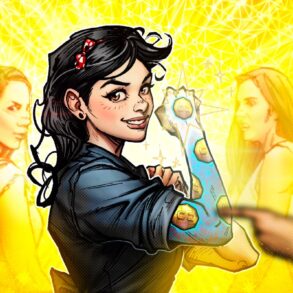What else would you call “Britain’s first professional Jewish pantomime” but Red Riding Hood and the Big Bad Pig? And where else would you set it but north London, at Hanukah? At the JW3 centre in London – an arts and community venue for “the Jewish, Jew-ish and Jew curious”, according to Will Galinsky, JW3’s programming director – the cast of the first professional stage production to merge two great traditions in Jewish storytelling and festive panto are gathered around a table sharing their experiences of both. And the crossover, it transpires, is richer and more obvious than one might first imagine.
Comedy, community, a fairytale quest and a flawed hero are “at the heart of every panto”, says the show’s writer, Nick Cassenbaum. “But I think it comes from [Judaism’s central text] the Talmud, too.” This is possibly the first time those two things have been linked, I suggest. “I think there’s something about the rhythms of Jewish storytelling that can feel cantorial. It’s the comedy and tragedy.”
So, too, the panto dame, he says – in this instance Mother Hoodman, Red’s eccentric mum who appears on stage heavily made up, wigged and wearing a voluminous dress modelled on a Hanukah dreidel singing You Spin Me Round – has a natural home in both traditions. “A panto dame is warm, loving and says the wrong thing. It’s a Jewish mother,” says Cassenbaum.
And so it is that when the show opens for a month-long run on 10 December, audiences will be immersed in a production that combines Jewish humour and music (imagine new lyrics to Jewish artists including Amy Winehouse, Doja Cat, Paul Simon and Craig David) with traditional panto magic – lots of slapstick comedy, a scene where the leads get lost in the woods, and cartoonish baddies – as it transposes the millennia-old Hanukah miracle into a fairytale fit for 2023.
Cassenbaum’s premise is that Red, a hard-working young scientist pushing against the plans her mum – the dame – has for her to marry a Jewish doctor, sets out on a quest to find enough sustainable energy to power her village through Hanukah. That echoes the ancient tale of the Jewish Maccabees, who made a drop of oil with which to light Jerusalem’s temple menorah last the festival’s eight days. The wolf, the main antagonist in the storybook version, is replaced here by a hyper-capitalist pig, the best known non-kosher animal of the lot. Although, Cassenbaum explains, “in my mind, all the characters are Jewish, even the pig, who as a city boy who made a lot of money under Thatcher, maybe isn’t so open about his Jewishness”.
Cassenbaum, a former street performer who now regularly collaborates with the Royal Court, first enjoyed a dry run at panto aged 15, when he wrote a production for children in the synagogue Hebrew classes he taught near his home in Woodford, east London. For this latest professional outing, he was interested “in how we could hold both things – something that was really British, all the panto techniques, but something that also felt unashamedly Jewish. With panto, you have to pick from the canon of fairytales. Red Riding Hood is such a short story, you’re not so set with the script. I wanted to make something that can hold Jewish traditions, dense Jewish jokes and reflect certain Jewish archetypes, so you’ll see the ex-black-cab driver and a wolf who is a neurotic mess.”

It means playing with storytelling modes, too, says Cassenbaum. “Some traditional panto story modes don’t feel Jewish, like a hero coming through on a particular journey. Like Tevye, in Fiddler on the Roof, I think the character, in Jewish tales, stays the same but the world around them changes.”
It mirrors the generational Jewish experience – and the immigrant humour that accompanies it. “Humour is our biggest cultural export. It’s truth humour,” says Josh Glanc, an award-winning Australian comedian who plays the pig. “I drifted away from my Jewishness in my teens,” he says of his upbringing in Melbourne’s Jewish community. “The yarmulke (skullcap) hasn’t been on for a while. This is my reimmersion.”
Cassenbaum and his cast draw on the history, liveliness and conversation of Jewish joke-telling, and capture how it lends itself to the interactivity of panto. “The way Jews have used comedy has shifted over the years,” says Cassenbaum. “People think of an American comedian or character who is outwardly Jewish and talking about being Jewish before others can. In British popular theatre, Jews were there from the off – Bud Flanagan (who sang the theme tune to Dad’s Army), writers Barry Cryer and Marty Feldman – but they weren’t ‘out’. Then, with more modern comedians, like Matt Lucas and Sacha Baron Cohen, the Jewishness is secondary to the joke. Through it all, there’s something about using community and humour as a way of fitting in and being part of things, a means of assimilation.”
Gemma Barnett, who plays Red, agrees. “It’s intense self-awareness,” she says. Cassenbaum describes her character, the panto’s heroine, as reflecting “that next generation of Jewish women stepping away from the traditional values but also existing within them”. There are parallels, says Barnett, with her own Jewishness. “I remember watching panto from a really young age and loving it, but my Jewishness always felt like more of a cultural, ethnic thing for me. Being in the industry I’ve often been asked ‘What’s your mix?’ My dad was Jewish and married out, which caused tension. I rejected my Jewishness and refused to have a bat mitzvah, never feeling Jewish enough in Jewish spaces. Red’s constantly trying to work out if she believes what her mum believes. I love the character.”
She has the unenviable task of performing Don’t Rain on My Parade by Jewish pop culture’s ultimate icon, Barbra Streisand. “Funny Girl was always my favourite film,” she says. “Barbra in that and Amy Winehouse, when she released Frank, gave me Jewish idols.” East London-born musical director Josh Middleton, a world-leading klezmer (eastern and central European Jewish folk) musician, has given Streisand and other Jewish artists a klezmer flavour, via accordion and violin live on stage, as well as a lyrical rewrite and song sheet, in pure panto style.
“The starting point for the music was clear,” he says. “Let’s take the premise of rewriting pop songs, because that’s what people expect at panto, but let’s do people of Jewish descent.” Even the incidental music parodies scores by Jewish writers such as Lalo Schifrin’s Mission: Impossible.
“I want them to recognise the songs and enjoy that familiarity, and I want them to feel they’re at a Jewish panto,” says Middleton. “Every regular theatre in the country will do a panto; this is something new and I hope it will help people connect to their Jewishness.”
Middleton’s parents ran a puppet theatre and took him to the local panto every year. He isn’t Jewish but he explains the influence: “I grew up in an atheist and Marxist household; lots of the Jewish cultural stuff deeply resonates with me. When you play folk music, the connection you feel to everyone whose played that before is very spiritual.”
The production promises joy for a community that has been darkened by the grief of the 7 October massacre by Hamas of 1,400 people in Israel, and the kidnapping of more than 240 more by Hamas, in Israel, as well as the war that has since ravaged Gaza and claimed the lives of more than 10,000 people. “Joy and community seem really important now,” says Galinsky. “Humour has long been the way that people deal with adversity at different times. At the moment, people feel a need to come together.”
JW3 – and its first pantomime, by default – focuses on inclusivity; the centre is also home to one of the London borough of Camden’s biggest food banks, feeding mostly non-Jewish households. “Our panto is very Jewish but it’s also very London,” Galinsky says. “The city is a mosaic of mixed heritages, like our community.”
The setting plays on the geography of London’s Jewish community – Red lives on the Edge of Ware (referencing the north London suburb of Edgware), while the pig, naturally, lives in Hampstead. Cassenbaum promises plenty of panto frolics, too: a Jewish bubbah (grandma) played by Argentinian acrobat Tiago Fonseca, and big character energy from the dame, played by Debbie Chazen (who previously appeared in Mark Ravenhill’s Dick Whittington and Stephen Fry’s Cinderella.) “The dame is usually played by a man,” says Cassenbaum, “but we have a wonderful Jewish woman who can do the job.
“I want Jewish audiences to have a really good time and feel what others get from the celebration of Christmas when they go to the panto; not to have to sit and enjoy it and then, at the last minute, when they sing We Wish You a Merry Christmas, go, ‘OK this wasn’t for us,’” Cassenbaum says. “For non-Jewish audiences, well, you don’t have to be an elf to enjoy Lord of the Rings. People just love a good story. They might laugh at different moments from others, but that’s the beauty of panto – it has always operated on different levels.”
Red Riding Hood and the Big Bad Pig is at JW3, London, 10 December to 7 January.
This post was originally published on this site be sure to check out more of their content.








